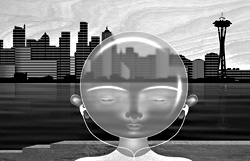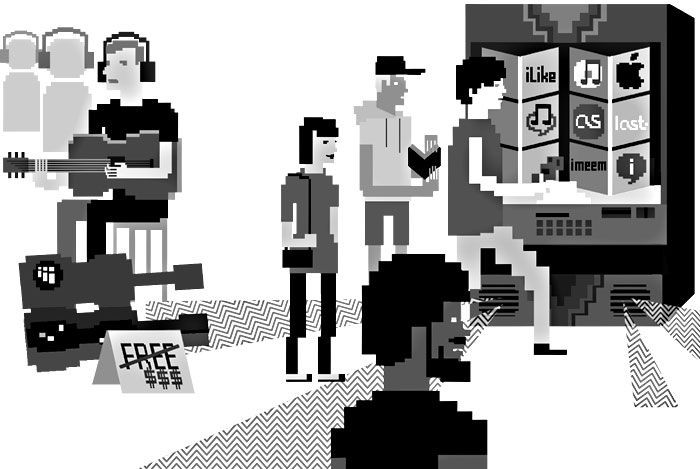“Tell me your iPod is not the best security blanket you’ve ever had. . . . With Jack at my side, I’m completely protected in my own, self-regulated, iPod bubble,” reads a 2004 editorial, “I Came, I Saw, iPod” in UC Berkeley’s student paper, The Daily Californian.
Though that same year, a notorious graffitied iPod ad put it more succinctly: “iPod: the ‘i’ stands for isolation.”
The great paradox of the iPod is that the cultural phenom (more than 120 million sold) is purely isolationist. Whereas social networking and cell phones make the private public, iPods—more ubiquitous than the Walkmen they replaced—turn music from a public aesthetic experience into a private, mobile affair. (Note the failure of Microsoft’s Zune, an attempt to make MP3 players a social affair by allowing users to share music wirelessly.)
Behind the white earbuds and hidden Journey playlists are real consequences of listening to music on headphones, now appearing in New York State legislation and neurology studies.
Like movies, iPods are a type of immersion technology that helps foster a “cinematic displacement of the world,” according to media theorist Scott McQuire. Diegetic sounds are unique to the outside environment, but iPods create constant nondiegetic sounds—originally a film term denoting off-screen mood music—creating a sense of detachment from your immediate surroundings, influencing your perception of the outside world. Hence people’s proclivity to do things while wearing iPods they normally wouldn’t, like singing Fergie at Trader Joe’s or staring at someone you deem attractive. (See: any episode of The Simpsons in which Homer listens to a football game in church.)
Brains on music work in mysterious ways. An article in the April 2006 Perception and Motor Skills by Charles Areni even found a positive correlation between the perceived passage of time and the number of songs listened to.
In a study from the Journal of Research in Music Education, Ohio State University’s Patricia Flowers found that when subjects were told to concentrate on either a piece of music or an excerpt of a book, they were significantly more distracted during the music—but also rated it as significantly more enjoyable.
“Music evokes images, memories, and emotions that can divert attention from analytical listening, but which are often highly pleasurable,” said Flowers. (And iPods—which, by definition play not just music, but music you like and have an active interest in focusing on—doubtlessly compound the issue of distraction.)
“Enjoyable yet distracting” differs from a recent survey conducted by employment agency Spherion, which found that nearly one-third of U.S. workers listen to music on iPods or similar devices while working. Of those, about 80 percent reported increased job satisfaction and productivity as a result of listening to their music. So how can iPods cause both increased distraction and productivity? By cutting people off from what they perceive as their main distraction: their co-workers.
This social isolation is another likely outcome of iPod use, according to Areni, a professor at the University of Sydney who studies environmental psychology, music, and cognition. “Have you ever tried saying ‘hello’ to somebody listening to an iPod? If I see the white or black wires sticking out of somebody’s ears, I don’t even bother, even if it’s a friend. Again, in crowded public spaces, this may be a desirable outcome.”
Psychologist Daniel Goleman, author of Social Intelligence, agrees that the isolation of iPods may be beneficial; in increasingly crowded urban areas, they can give listeners a larger, more comfortable sense of personal space.
Reliving a transcendent musical moment can energize and heighten one’s experience of, say, riding the bus, but the perils of distraction are real. iPods have been cited in pedestrian deaths, and a study released last week by the Clemson University psychology department showed that drivers using MP3 players veered out of their lanes 10 percent more than drivers talking on cell phones.
Robert Nell, Sony’s former vice president in charge of audio products, said in 1999 that the Walkman’s great achievement was that it “provided listeners with a personal soundtrack to their lives.” Even when that soundtrack might be New Age-y humpback-whale mating calls designed to spur work productivity and inner peace, it’s still noise.
“From my perspective as a professional, technologies like the iPod only serve to add another layer of noise and distraction to an already very complex, troubling matrix we find ourselves driven to,” states Bernie Krause, who has studied bioacoustics for three decades. “The increase in glucocorticoid enzyme levels (aka stress levels) and other indicators are measurable results of these types of noise. Did anyone ever wonder why it is that so many folks living in noisy urban centers are on so much Prozac and related medications?”









